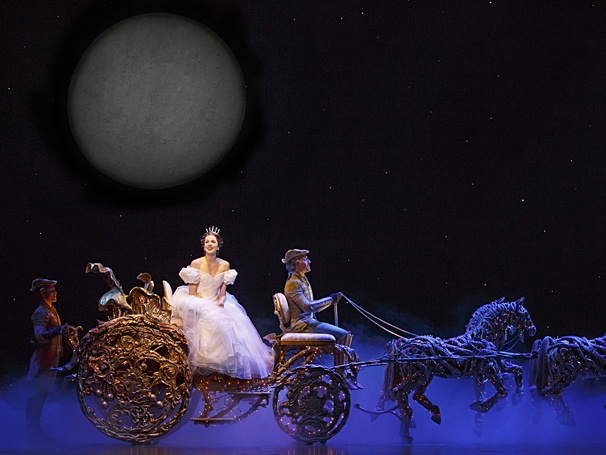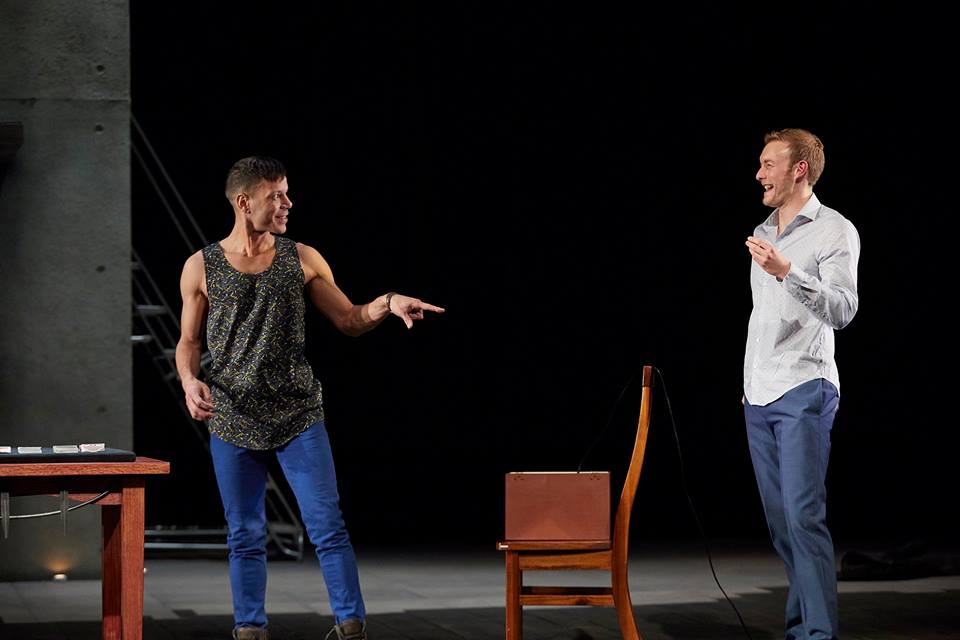Paige Faura in Rodgers & Hammerstein’s Cinderella.
Photo-Carol Rosegg
Rodgers & Hammerstein’s Cinderella
Book & Lyrics by Oscar Hammerstein III
Music by Richard Rodgers
New Book by Douglas Carter Beane
Directed by Mark Brokaw
Review by Kathi E. B. Ellis
Entire contents copyright © 2015 by Kathi E. B. Ellis. All rights reserved
This season’s Broadway Series kicked off on September 15 with the newly minted 2013 Broadway production of Rodgers and Hammerstein’s Cinderella. In a year in which we’ve also seen Kenneth Branagh’s live-action Walt Disney Cinderella and the movie version of Sondheim’s Into The Woods, there comes to Louisville yet another iteration of the fairy tale that traces its roots back to Perrault and the Brothers Grimm. Playwright Douglas Carter Beane brings a sharp, post-modern self-awareness to characters new and old in a visually sumptuous production (Costume Designer William Ivey Long won the Tony Award for his designs.)
Tuesday’s enthusiastic opening night audience, replete with many mini-Cinderellas in full ball regalia, found much that was familiar to them, together with major differences from the Disney animated movie and the TV versions with which most are familiar. Many of the new plot points do trace their way back to the many traditional versions of the fairy tale, but some of those will feel new to audiences – potential spoiler alert – Does Cinderella meet the Prince before the ball? How many balls/banquets does the Prince host? Is one of the stepsisters really quite nice?
Anna Louizos’ scenic design is on full display as the audience enters the Whitney Hall; a forest setting that has the quality of a pop-up book illustration in its ‘flat’ three-dimensionality, taking the audience back to the traditional fairy tales. The other locations, of cottage, palace, and Town Square, are accomplished with moving and flying units that swirl into and out of scenes as performers provide masking choreography, mostly with success, in front of the scene changes. Lighting designer Kenneth Posner provides appropriately moody and brilliant environments throughout. Ivey Long’s spectacular costume transformations of Cinderella are reminiscent of the hikinuki tradition in Kabuki and resulted in appreciative gasps and applause; the transformation into the Fairy Godmother, on opening night, was less smooth – hopefully a one night glitch.
A new storyline to the Rodgers and Hammerstein Cinderella is the introduction of Jean-Michel (Will Blum), a would-be revolutionary who is also in love with stepsister Gabrielle (Kaitlyn Davidson). In a post-2008 recession world, this story line reverberates with recent ‘Occupy’ movements, and culminates in a meeting between these two, the Prince (Andy Huntington Jones), Ella (Paige Faure) and the villagers – out of which comes the Prince’s desire for free and fair elections. Not your typical Cinderella story! And on a night that our community was hosting a gubernatorial debate, knowing chuckles rippled throughout the auditorium. Gabrielle’s humanity, a relatively unusual attribute for a step-sister, came to full fruition in a scene in which she discerned Ella as the mystery princess and the two of them determined to keep both their secrets from Madame (Beth Glover). Their secrecy was pledged during “A Lovely Night”, one of four new-to-Cinderella Rodgers and Hammerstein songs that were added to the original songbook of the show.
More typical of the storyline we recognize is the haughty, uncaring Madame (as stepmother) and the second stepsister Charlotte (Aymee Garcia), whose exuberant character was placed firmly in the English pantomime tradition. A nod to Disney’s animated version was the fox and the raccoon puppets that, while delightful, were a trifle too twee in their synchronized responses. However, their human doppelgängers of footman (Tanner Ray Wilson) and driver (Chip Abbott) has some of the most exciting choreography of the evening.
One of the highlights of any Cinderella story is the ball scene, and in this version, the first ball scene is that highlight. After a suitable period of the Prince being paired with the inappropriate stepsisters and a game of ridicule, turned on its head by the kindness of Ella, the focus hones in on the Prince and Ella falling in love. Josh Rhodes’ choreography provides a softly fluid backdrop of dance moves among the court that allows our attention to flow naturally to the sparkling white-costumed pair, whose relationship blossoms as they dance. This scene feels like homage to the Tony/Maria meeting in West Side Story, as other scenes also reflect other musicals (for example Man of La Mancha in the monster-confrontation first scene). Just as the audience settles into the familiar rhythm of this part of the story, there is (for many) an unexpected twist right at the end of the first act. How can the story possibly turn out now?
The second act offers more variants of the Cinderella story before we get to the Prince’s search for the girl whose foot fits the glass slipper and we are, again, on familiar territory where we know that, despite tricks and trials, the prince will find Ella. In this version, the Prince is given more prominence, we get to learn more about Topher (one of his many, many names), and we learn that Ella can help him become the king he wants to be; a plot twist that definitely brings the fairy tale into the 21st century. On opening night Jones’ early scenes seemed more tentative than necessary for even a prince with insecurities, but as the evening progressed his performance grew in stature and the audience was completely with him when he finally put his Prime Minister (Blake Hammond) in his place. Another member of the court, Sebastian, is a delightful cameo role, played with authority by Antoine L Smith. Liz McCartney plays Marie/Fairy Godmother with zest and strength.
While there is much for a younger audience to enjoy in this iteration of the centuries old tradition of Cinderella, this version has a knowing aspect that speaks more directly to adults, and the humor is decidedly contemporary and ironic. And in this balance lies a tension that is not always successfully negotiated in script or performance. For the generations who have known Cinderella and her Prince for more than ten minutes, not everything that is new to the well-known story are, indeed, possible.
Rodgers & Hammerstein’s Cinderella
September 15 – 20, 2015
PNC Broadway In Louisville
Kentucky Center for the Performing Arts
501 West Main Street
Louisville, KY 40204
502-584-7777
http://louisville.broadway.com
Kathi E.B. Ellis is a member of the Lincoln Center and Chicago Directors’ Labs and an associate member of the Stage Directors & Choreographers Society. She has attended the LaMama Directing Symposium in Umbria, Italy, and is featured in Southern Artisty, an online registry of outstanding Southern Artists. Her directing work has been recognized with nominations for the South Florida Theatre Carbonell Award. Locally, Kathi is a member of Looking for Lilith Theatre Company, a founding principal of StageLab theatre training studio, and is part of ShoeString Productions an informal producing collective. She has written book reviews and articles for Southern Theatre, the quarterly publication of the Southeastern Theatre Conference, and was a contributing writer for JCPS’ textbook for the 11th grade Arts and Humanities survey course and for YouthArts Tapestry, a Kentucky Arts Council publication.




